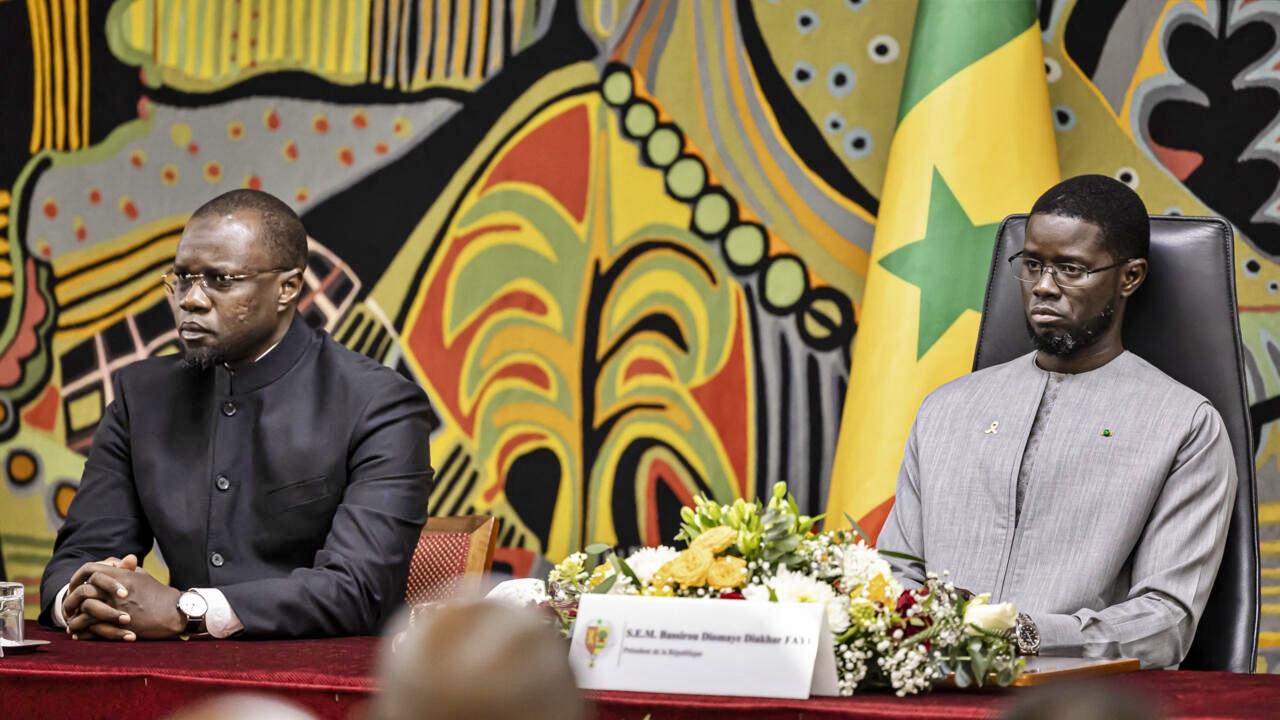Gambiaj.com – (DAKAR, Senegal) – In a clear show of defiance, Ousmane Sonko’s PASTEF party has pushed back against President Bassirou Diomaye Faye’s decision to restructure the governing Coalition Diomaye Président, declaring instead the emergence of a new alliance under its own leadership, the Patriotic Alliance for Work and Ethics (APTE).
The move exposes the deepening political rift between President Faye and his longtime ally and political mentor, Prime Minister Ousmane Sonko, who played a pivotal role in Faye’s rise to the presidency in March 2024.
A Presidential Reshuffle That Rekindles Tensions
On November 11, 2025, President Diomaye Faye announced the end of Aïda Mbodj’s mission as coordinator of the Coalition Diomaye Président, a position she had held since the election. He justified the decision as part of an effort to revitalize the coalition, which he described as “lethargic and divisive.”
To lead the restructuring, Faye appointed former Prime Minister Aminata “Mimi” Touré, a decision widely seen as both an assertion of authority and an attempt to broaden his political base beyond PASTEF’s orbit.
“The coalition must become more operational, better structured, and fully effective,” Faye stated in his letter, noting that he had informed Mbodj of his decision as early as September.
However, the appointment of Touré, a seasoned politician and former opponent of Sonko’s movement, immediately drew sharp criticism from PASTEF, which denounced the move as illegitimate.
PASTEF Announces Its Own Coalition: The APTE Alliance
In a strongly worded statement, PASTEF stated that President Diomaye Faye “does not have the power to dismiss Mrs. Aïssatou Mbodj,” insisting that she was appointed by the Conference of Leaders, not by the President himself.
The party went further, emphasizing that “the coalition never had Bassirou Diomaye Faye as its president; he was merely its candidate.”
This declaration marks a striking attempt by Sonko’s camp to redefine the boundaries of authority within the ruling political apparatus. By challenging Faye’s legitimacy over the coalition’s internal structure, PASTEF is asserting its continued ownership of the political project that propelled him to power.
PASTEF also revealed that the coalition restructuring process was already underway, but under the guidance of Aïda Mbodj and the existing Conference of Leaders.
The party detailed that key documents, including a charter, internal regulations, and an organizational structure, had already been drafted and circulated among partners.
A new name, APTE (Patriotic Alliance for Work and Ethics), had even been proposed, reflecting the coalition’s transition beyond its electoral phase. “Since Diomaye Président has achieved its objective, it is time to move forward,” the party stated.
The party said it is now focused on merging with allied movements, expanding its militant base, and finalizing the establishment of the APTE coalition, under the leadership of Aïda Mbodj.
Mimi Touré’s Appointment Deepens the Divide
PASTEF made clear that it “does not recognize itself in any initiative coordinated by Mrs. Mimi Touré,” declaring that it shares “neither the same values nor the same principles” with her.
Touré’s involvement is particularly controversial given her past clashes with Sonko and her alignment with the establishment forces PASTEF once opposed.
Her appointment by Diomaye Faye has therefore been widely interpreted as a symbolic distancing from Sonko’s anti-system politics and a move toward institutional pragmatism.
A Political Divorce in Slow Motion
The emergence of APTE and PASTEF’s open rejection of Faye’s authority signals the beginning of a potential realignment in Senegal’s governing majority.
While President Diomaye Faye seeks to consolidate his leadership and project independence from Sonko’s shadow, PASTEF appears equally determined to preserve its ideological purity and grassroots control.
What began as a partnership built on shared struggle and mutual trust is now evolving into a complex contest for political ownership, one that could reshape Senegal’s ruling coalition and redefine the balance of power within it.
President Faye’s attempt to assert control over coalition politics marks a bold, and risky, test of his independence. Yet PASTEF’s countermove with the APTE alliance exposes just how much of his political base still answers to Sonko.
The tension between the two men is no longer a question of personal loyalty but of political survival. For Faye, leadership now means governing beyond PASTEF; for Sonko, it means reclaiming the moral and ideological compass of the revolution that brought them both to power.
If neither side concedes ground, Senegal may soon witness a formal split within the coalition that just eighteen months ago swept away the old political order.










